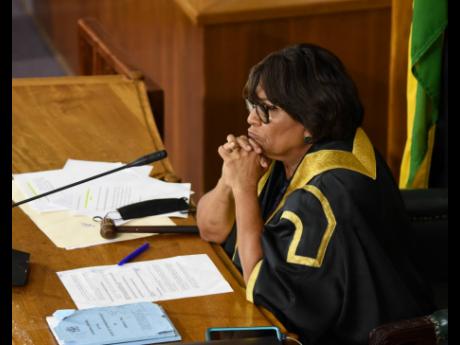GLC dismisses Dalrymple-Philibert’s request to throw out misconduct case against her
The General Legal Council (GLC) has thrown out the request by House Speaker Marisa Dalrymple-Philibert to dismiss the case of professional misconduct brought against her by some of the children of the late Clinton Clarke regarding what they perceived as improprieties with their father’s estate.
The GLC is the state entity that regulates the legal profession in Jamaica. Its disciplinary committee hears complaints against lawyers.
The case, which is now in its 24th year, was first dismissed by the GLC in 1995, shortly after Dalrymple-Philibert became member of parliament for Trelawny Southern, but was reopened nearly a decade later.
Richard Clarke, the biological child of Clinton Clarke, who is the complainant, as well as legal beneficiary, has been seeking redress after the case went dormant for years when the files could not be located. In 1997 the GLC dismissed the case on the strength of Dalrymple-Philibert’s response, and without a hearing from the younger Clarke.
A decade and half later, it was reopened after the files were located among the documents in the office of disbarred late attorney EH Williams. Additional information allowed Clarke to file an updated affidavit.
The Disciplinary Committee, by way of a nine-page letter dated June 2, 2022, told Dalrymple-Philibert’s lawyers, King’s Council Ransford Braham and David Johnson, that it was refusing the application for the matter to be dismissed. This follows her first application to dismiss/stay proceedings together with an affidavit in 2014 following the reopening of the case.
Dalrymple-Philibert, the Speaker of the Lower House of Parliament, has strongly refuted the complaint against her.
She sought orders (pursuant to the Legal Profession) Disciplinary Proceedings (amendments) Rules 2014 (Rule)7(2) that (a) “Complaint No.168/2013 or such part(s) thereof relating to the professional conduct of the applicant in handling the estate of Clinton Clarke, deceased, be dismissed and/or stayed on the ground that the delay in prosecuting the said complaint has caused substantial prejudice to the applicant and is therefore an abuse of the process of the Tribunal. (b) There be such further or other relief as may be just in the circumstances…” the letter from the Disciplinary Committee said.
On June 29, 2017, an amended Notice of Application to dismiss/stay proceedings sought orders that the delay will deny or deprive her of a fair hearing/trial; substantial prejudice has arisen because of the delay, and if the hearing is permitted to proceed after all the delay and/or prejudice, there will be an abuse of the process and/or breach of the provisions of the Charter of Fundamental Rights and Freedoms (Charter of Rights) sections 13 and 16(1) and (2).
Her affidavit said the substance of the allegation is the same as part of or similar to the earlier complaint, which is contrary to the principles of res judicata, issue estoppels, and that it was an abuse of process.
The facts of the case outlined by the GLC in the June 2 letter are eerily similar to that submitted by Dalrymple-Philibert following the GLC’s decision to reopen the case. Submissions from Braham and John Clarke for the Clarke estate were considered by the three-member panel of chairman Richard Donaldson, Gloria Langrin and Anna Gracie.
The letter outlined the number of case laws cited by Braham to support the two reasons which should bar the hearing. The panel said the principles of the authorities were not applicable as the complaint brought in 1995 was dismissed without a hearing on said merit.
MORE THAN 20 HEARINGS
The panel noted that the main thrust of Braham’s argument was “for the panel to embark on a hearing at this late stage was a breach of the attorney’s right under the Charter of Fundamental Rights and Freedoms”. He cited two cases, and noted that the attorney, in bringing a new case, was in breach of his client’s right to have the matter heard within a reasonable time, and that EH Williams was not available to testify on behalf of Dalrymple-Philibert.
John Clarke, in his submissions, said the Disciplinary Committee was a creature of statute and that it could not exercise a power or authority not given to it by the statute; that it has no power to stay or strike out the matter; that there was never a hearing on the merits for issue estoppels to arise, and that though there was delay there were reasons inclusive of the attorney’s own action.
In seeking redress, Richard Clarke has written to more than a dozen law enforcement bodies seeking compensation for what he alleges to be professional misconduct. The complaint involves three properties, but at the heart of the dispute is the commercial property at 92 Barnett Street, which it is alleged that Dalrymple-Philibert sold after fraudulently obtaining a title and failure to discharge the matters for which her services were sought.
As a consequence, two of the biological children of Clinton Clarke and legitimate beneficiaries to the estate had to use adverse possession to legitimise living on them.
Since the case reopened, there have been more than 20 hearings, including during the pandemic, when they were held online.

